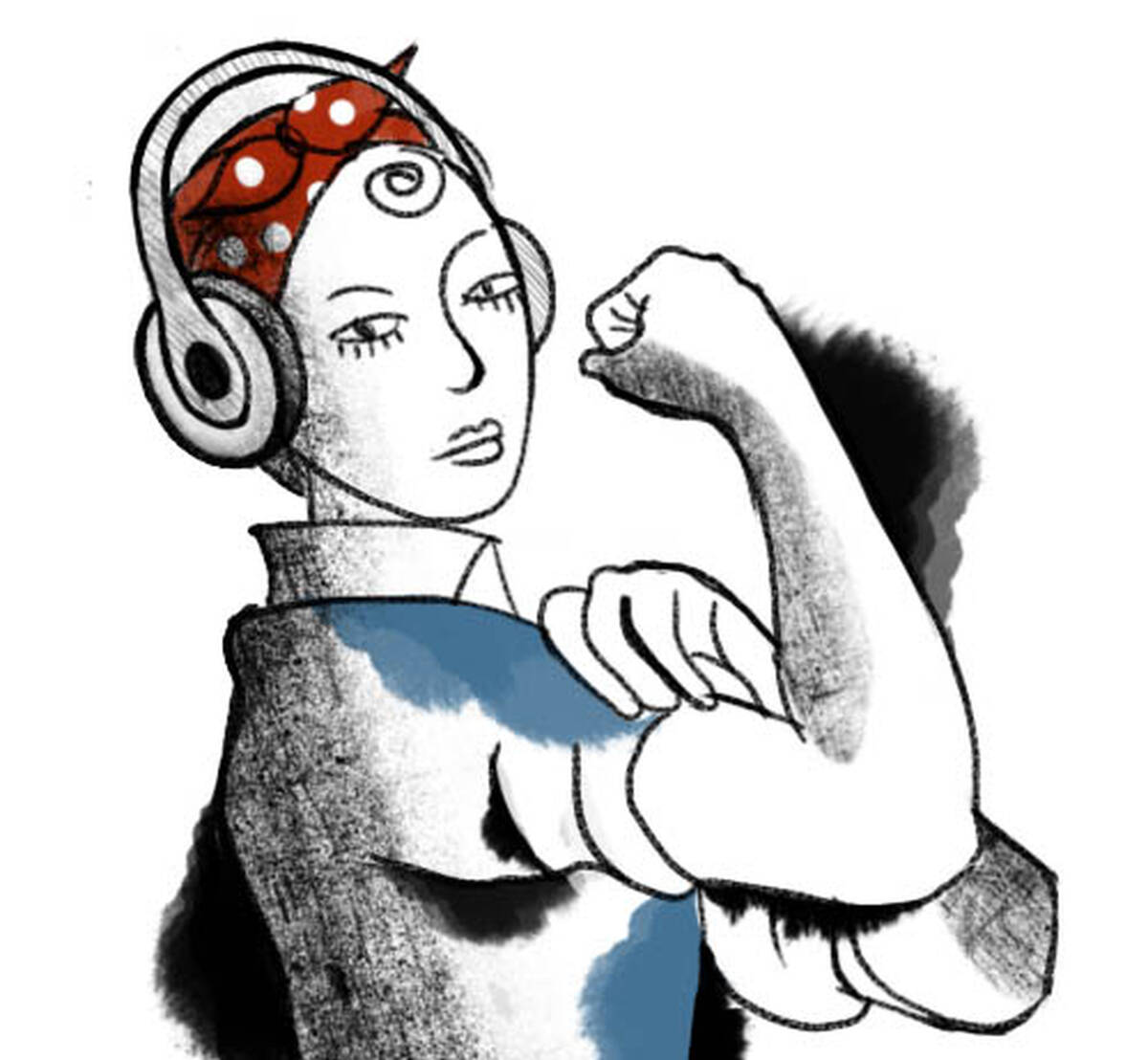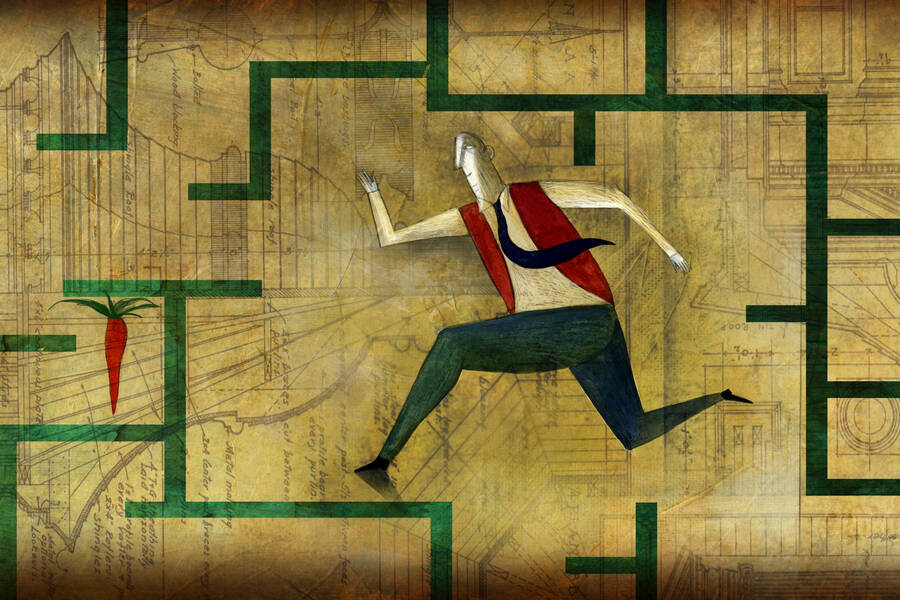One way we do so is by acquiring status-related objects, such as a luxury watch or sports car—or even, based on research from marketing professor Derek Rucker, a big slice of pizza.
In one experiment, he and coauthors found that participants rated a person as higher status when they chose a larger-sized piece of pizza, smoothie, or coffee compared to when they had a smaller version of the same treat.
And this belief about size and power impacted people’s actual food choices. In another experiment, participants who were made to feel temporarily powerless chose larger pieces of bagels than those who were prompted to feel powerful.
“Even with mundane objects, we might choose bigger objects over smaller ones,” Rucker says. “And of course you can see the implications that could have, such as how much food you consume, how much you spend, and so on.”
2. Pump Up the Jams to Feel Powerful
Want an easy way to feel powerful that won’t affect your waistline? Put your headphones on and blast some Queen.
That’s what Rucker and Loran Nordgren, an associate professor of management and organizations, along with colleagues, found in research inspired by the rituals of professional athletes.
“One ritual we have noted is that athletes often arrive at the stadium wearing earphones,” Rucker says. “And these athletes often emerge from the locker room to the sound of music pounding. It is as if the music is offering a psychological coat of armor for the competition about to occur.”
The researchers wanted to understand whether music can provide such armor. To start, they asked participants to listen to songs and rate each one’s ability to empower.
The winners—Queen’s “We Will Rock You,” 2 Unlimited’s “Get Ready for This,” and 50 Cent’s “In Da Club”—were compiled into a “high-power” playlist. Three other songs, similar in style but rated as less empowering, became the “low-power” playlist.
A new group of participants listened to either the high- or low-power playlist while completing different tasks. For example, they were shown word fragments like P _ _ E R, which could either be completed as a word related to dominance (e.g., POWER) or as an unrelated word (e.g., PAPER). Those that listened to the high-power playlist were more likely to complete the fragment using power words than those listening to the low-power playlist.
In another experiment, the high-power playlist changed the way people said they would act.
“One thing we know from prior research is that people who feel powerful tend to make the first offer in negotiations. Essentially, power can incite a propensity to act, to take charge of the situation,” Rucker explains.
After listening to music, participants were asked whether they would prefer to go first or second in a debate. The high-power-playlist group opted to go first significantly more often (34%) than those who had listened to the low-power playlist (20%).
3. Is It Lonely at the Top?
So, armed with your giant smoothie and empowering song, you’re feeling powerful. Or maybe you actually are powerful, with a position at the top of your department or company. How does it feel up there?
One common misbelief is that it’s lonely at the top. People in positions of power tend to feel less lonely, according to research by Adam Waytz, an associate professor of management and organizations.
In one experiment by Waytz and coauthors, participants completed questionnaires, rating their agreement with statements such as “I can get others to do what I want” and “I lack companionship.” The results: the more power respondents reported having, the less loneliness they claimed to experience.
In another study, some participants were prompted experimentally to feel either powerful or powerless. Participants in the high-power group then reported feeling less lonely than the low-power or baseline groups, while participants in the low-power group showed the opposite pattern.
These findings demonstrate a basic human need to belong to groups, Waytz says. And the notion that power gives you access to resources that other people want can help assuage that need to belong.
“That makes you feel, ‘Wow, I have all the things that I need to form a group, to form an alliance, to get people to come to me,’” Waytz says. “And so that need for belonging that is really central to human existence is alleviated.”
4. Assessing a Leader’s Power
Now let’s look at the influence of the undisputedly powerful—national leaders.
Strategy professor Benjamin Jones wanted to understand how much of an impact these leaders have on their countries’ economies.
So he and a coauthor studied 57 instances in which a national leader died unexpectedly while in power (though not by assassination, which could be related to other political or economic factors). In comparing periods before and after these unexpected leadership transitions, the researchers found that economies showed 31% more variability in their growth following the leaders’ death.
Interestingly, though, not all types of government are equally sensitive to random changes in leadership. Democracies appear to be relatively insulated. But leaders’ deaths triggered substantial economic change in autocratic countries, which typically have limited competition for leadership and impose few constraints on the executive.
5. How Much Power Do Activists Have?
Now to a group that often feels powerless: activists. Yet according to research from Brayden King, a professor of management and organizations, over the long haul activists can make a real impact on how companies operate.
King and coauthors found that the companies targeted most frequently by activist groups were the ones most likely to create initial responses that led to farther-reaching reforms over time.
These responses often took shape in two ways: establishing a committee on social responsibility and developing a report that details the firm’s commitment to social responsibility. These reforms, though initiated as responses to activism, are usually permanent. The committee never dissolves, and the reports are issued year after year.
“Two things generally happen when you do these reforms,” King says. “You create a public commitment to be more engaged with activist groups and demonstrate that you are willing to talk about these issues. That’s the public side of it. But also, internally, you create a set of champions—people who believe in the cause the activists represent. They become invested in making sure things are done right and that the voices of stakeholders are being heard.”




